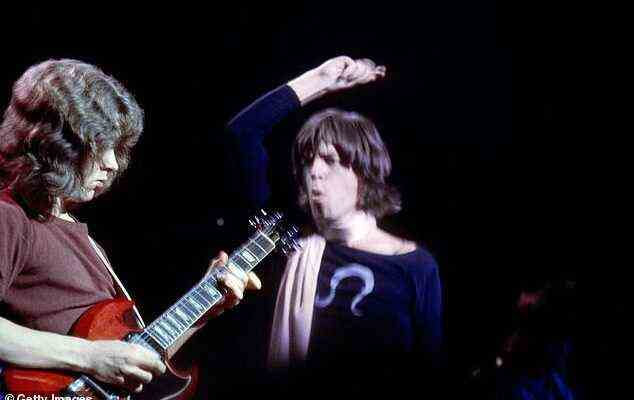Mick Jagger and Keith Richards have announced the Rolling Stones will stop performing hit song Brown Sugar, amid discomfort about the 50-year-old classic’s references to slavery.
The band, currently on the road for a 13-date U.S. tour, have not played Brown Sugar – one of their most recognizable songs – since kicking off in St Louis on September 26.
The 1969 song has been a staple of their live show since it came out 50 years ago, and is the second most played song in their catalog after Jumpin’ Jack Flash, with 1,136 known performances, according to Rolling Stone magazine.
The last time the Stones played it live was August 30, 2019, at Hard Rock Stadium in Miami, Florida.
Jagger, asked about the song’s absence from their recent set lists, told The Los Angeles Times they had decided to give the song a break.
Mick Jagger is pictured in 1969 at the Altamont Speedway festival in California – the first time they played Brown Sugar. He is seen with Mick Taylor, who left the band in 1974 and was replaced with Ronnie Wood

Mick Jagger, Keith Richards (right) and Ronnie Wood (left) are seen on stage in Nashville on Saturday night. The band have decided to stop performing Brown Sugar on this tour
‘We’ve played ‘Brown Sugar’ every night since 1970, so sometimes you think, We’ll take that one out for now and see how it goes,’ he said.
‘We might put it back in.’
Keith Richards, who wrote the song with Jagger during a 1969 recording session at the famed Muscle Shoals studio in Alabama, said he was taken aback by the recent discomfort about the lyrics, since it was always a grotesque story about slavery, rape and sexual violence.
‘I’m trying to figure out with the sisters quite where the beef is,’ Richards, 77, said.
‘Didn’t they understand this was a song about the horrors of slavery?
‘But they’re trying to bury it. At the moment I don’t want to get into conflicts with all of this s***.
‘But I’m hoping that we’ll be able to resurrect the babe in her glory somewhere along the track.’
The Stones’ latest – and possibly final – performance of the track was in 2019, when the lyrics caused a backlash, with the woke brigade claiming that the band should not continue to sing the track.
Writing in the Chicago Tribune, music producer Ian Brennan said: ‘The issue today is not that they ever wrote the song.
‘Nor that they have ever sung it. The fault is that they keep singing it.’
The song has been controversial from the start, and the band have frequently tried to tone down the lyrics.
It was originally titled ‘Black P****,’ but Jagger decided before releasing it that the title was too ‘nitty-gritty’.
The original phrasing was: ‘Brown Sugar, how come you taste so good? / Ah, got me feelin’ now for brown sugar, just like a black girl should.’
The band in later recordings swapped the words ‘black girl’ for ‘young girl’.
Jagger explained in an interview back in 1995 that he was uncomfortable with the lyrics.
‘God knows what I’m on about in that song,’ said Jagger, in a 1995 interview.
‘It’s such a mishmash. All the nasty subjects in one go.’
The song was written in 45 minutes, and Jagger described it as ‘a very instant thing’.
‘I never would write that song now,’ he said.
‘I would probably censor myself. I’d think, ‘Oh God, I can’t. I’ve got to stop. I can’t just write raw like that.’
The classic has been a topic of controversy in recent years with Vulture describing the song as ‘gross, sexist, and stunningly offensive toward black women’ in 2015.
It has commonly been thought that Brown Sugar was written by Jagger to his former lover Marsha Hunt.
Hunt, who bore Jagger’s first child Karis, is an American-born singer who is considered to be the inspiration for the Stones’ 1971 classic.
Jagger had an affair with Hunt while he was dating his girlfriend-of-three years Marianne Faithfull, after spotting Hnt when she appeared as the female lead in the controversial musical Hair.]
Mick got his PA to contact Marsha to ask her to appear on the cover of the Stones’ new single, Honky Tonk Women, and within days their clandestine affair was in full swing.
On July 5, 1969, Mick announced his affair with Hunt in typically public fashion while performing at a concert.
Sitting in the crowd, just yards from his live-in girlfriend Faithfull, was singer Marsha. Mick opened the musical part of the show by belting out a cover version of the rock song I’m Yours And I’m Hers.
Two days later, Marianne and Jagger flew to Australia where he was due to begin playing the starring role in the flop film Ned Kelly and within months, his relationship with Faithfull was over and he moved Hunt into his Chelsea house.
Already missing Marianne’s son, Nicholas, to whom he had become a surrogate father, he took Marsha out to Mr Chow restaurant in Knightsbridge, where he asked her to have his child.
But their relationship faltered not long after and Jagger dumped Hunt when she was pregnant in 1970. Hunt gave birth to Karis on November 4, 1970, at St Mary’s hospital in Paddington, and she went through the birth alone.
Soon after ending his relationship with Hunt, he moved 22-year-old Californian model Catherine James, who had recently dated his friend Eric Clapton, into his Chelsea home.
After the relationship turned sour, Hunt was forced to take Jagger on in a legal battle to make him acknowledge Karis was his daughter and pay his way in her upbringing.
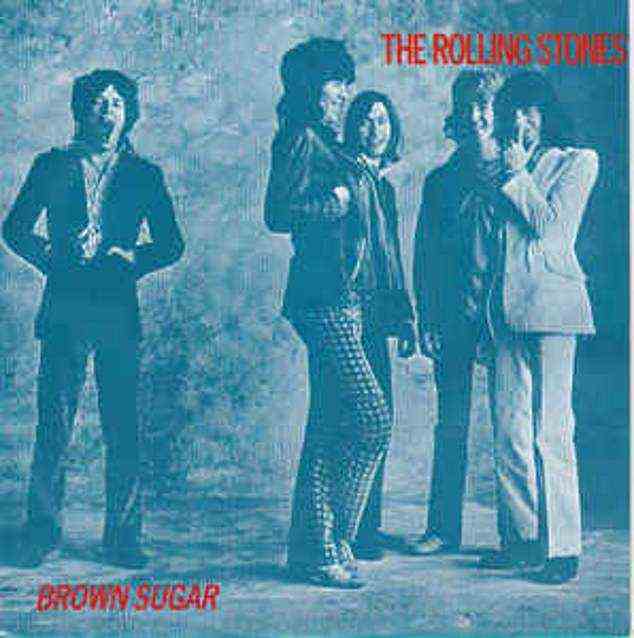
Brown Sugar was recorded in 1969 at Muscle Shoals studio in Alabama
In June 1973, Marsha launched court action and after three hearings, Mick agreed to pay into a £10,000 trust for Karis, plus £500 a year, in an out-of-court deal. But his lawyers insisted his former lover sign papers saying he was not the father.
By the time Karis was seven, her mother was reduced to claiming welfare handouts in Los Angeles where she moved in a bid to revive her flagging showbiz career.
In January 1979, a court in LA ruled that Jagger was the girl’s father and ordered him to pay $1,500-a-month child support.
In 1992, when Karis graduated from America’s prestigious Yale University, her proud father was there, video camera in hand. Mick also invited her to Buckingham Palace when he accepted his knighthood from Prince Charles in 2003.
A year earlier, he wiped away tears when he was on hand to give away Karis — now a film producer in Los Angeles — as she married film director Jonathan Watson.
In 2012, handwritten love letters from that were written by Jagger from the set of Tony Richardson’s film Ned Kelly, which was shooting in Australia, to Hunt were auctioned off by Sotheby’s for nearly £190,000.
‘Someone, I hope, will buy those letters, as our generation is dying,’ she said. ‘And with us will go the reality of who we were and what life was.’
The singer said the letters chronicling their ‘delicate love affair’ that was kept secret until 1972 touch on subjects such as the first moon landing and John Lennon and Yoko Ono.
In one, 25-year-old Jagger writes: ‘I will kiss you softly. And bite your mouth, too.’
In poetic mood in another letter, Mick ruminates: ‘If I sailed with you around the world, all my sails would be unfurled.’
Speaking about the letters in a statement, Hunt said: ‘When a serious historian finally examines how and why Britain’s boy bands affected international culture and politics, this well-preserved collection of Mick Jagger’s hand written letters will be a revelation.
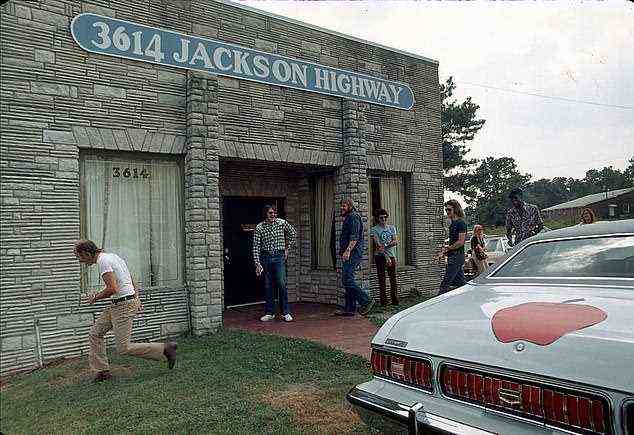
The studio has seen artists such as Aretha Franklin, Rod Stewart, Cat Stevens, Joe Cocker, Willie Nelson and George Michael record
‘This is Mick in his own words… This is part of English history, it is part of rock history, part of cultural history and it corrects all the misinformation,’ she said, according to Rolling Stone.
The band was also asked what it was like to be on tour without Charlie Watts, their drummer, who died aged 80 in August, having never missed a show.
Every night they have opened with a montage of images of Watts, who has been replaced by Steve Jordan, 64, who has known Watts since he was 19 and began playing with Richards in the mid 1980s.
‘I’m still trying to put it together in my head,’ said Richards.
‘I don’t think I can be very erudite on Charlie at the moment.’
Ronnie Wood, 74, was the last of the band members to see Watts alive. His death took them all by surprise, he said.
He visited Watts in a London hospital room — the same room where Wood was treated for cancer in 2020.
‘We call it the Rolling Stones suite,’ Wood told the paper, laughing.
‘We watched horse racing on TV and just shot the breeze. I could tell he was pretty tired and fed up with the whole deal.
‘He said, ‘I was really hoping to be out of here by now,’ then after that there was a complication or two and I wasn’t allowed back. No one was.’
Richards said Watts was ‘one of the funniest guys I’ve ever known.’
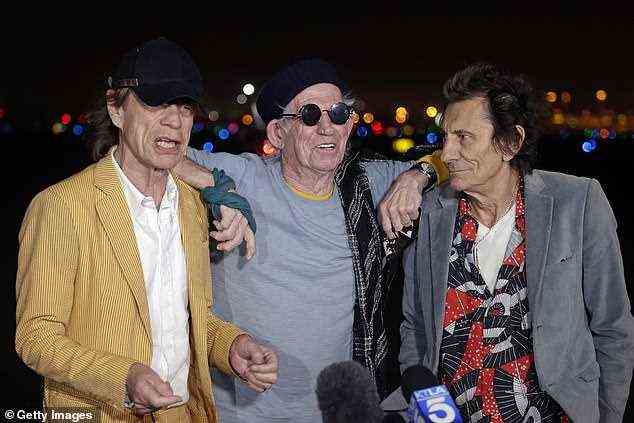
Jagger, Richards and Wood are seen on Monday touching down at Hollywood Burbank Airport ahead of their shows in Los Angeles at the SoFi Stadium on Thursday and Sunday

Jagger, Richards and Wood are seen on stage on September 26 in St Louis, on the first night of their U.S. tour
He added: ‘And the most unlikely man to be famous. He hated that side of the job and used to savagely take the piss out of it.’
Jagger said: ‘He didn’t do email or text or FaceTime, so I’d phone him and we’d talk about football.’
Asked whether the band should retire after Watts’ death, Jagger replied: ‘I don’t, really.’
He continued: ‘No band is the same when you lose someone. But the Stones is a very resilient band. We’ve been through a lot of ups and downs through the years, and we’ve had changes of personnel, as have a lot of bands.
‘When you’re a band for this long, it’s unlikely you won’t have any changes.
‘Of course, this is probably the biggest one we’ve had.
‘But we felt — and Charlie felt — that we should do this tour. We’d already postponed it by a year, and Charlie said to me, ‘You need to go out there. All the crew that have been out of work — you’re not gonna put them out of work again.’
‘So I think it was the right decision to keep going. The band still sounds great onstage, and everyone’s been really responsive at the couple of big shows we’ve done so far.
‘They hold up signs saying, ‘We miss you, Charlie,’ and I miss him too.’
Paul McCartney dismisses the Rolling Stones as ‘blues cover band’ after Mick Jagger joked that Beatles ‘never even did an arena tour’
Paul McCartney has called The Rolling Stones a blues cover band in a new interview in which he compared his Beatles to their fellow British musical legends.
‘I’m not sure I should say it, but they’re a blues cover band, that’s sort of what the Stones are,’ McCartney, 79, told The New Yorker. ‘I think our net was cast a bit wider than theirs.’
The comments came about a year-and-a-half after McCartney told Howard Stern he believed his band was better overall.
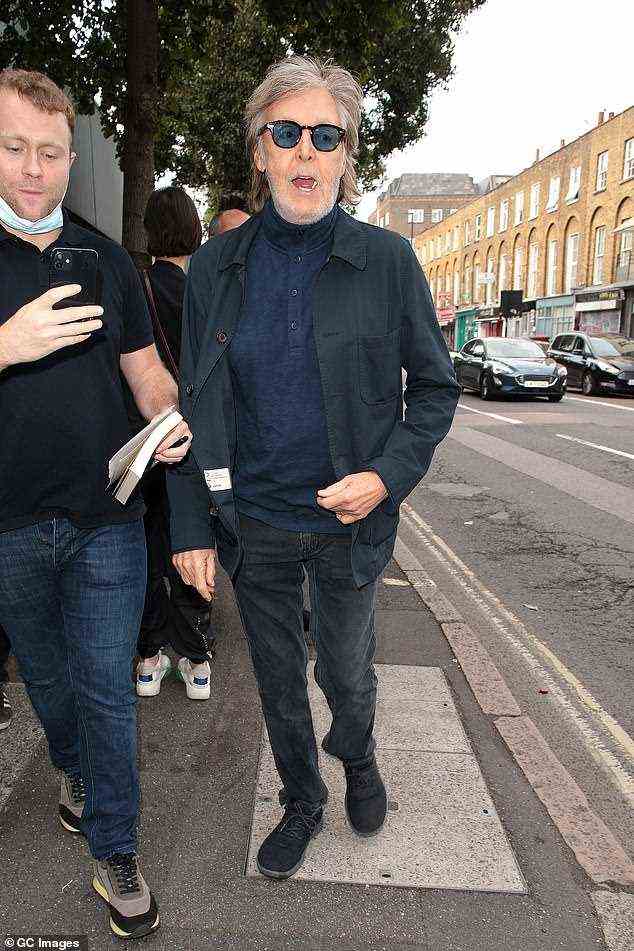
The latest: Paul McCartney, 79, called The Rolling Stones a blues cover band in a new interview in which he compared his Beatles tp their fellow British musical legends. He was snapped last month in London
‘They are rooted in the blues,’ McCartney said in the April 14, 2020 interview. ‘When they are writing stuff, it has to do with the blues. We had a little more influences.
‘There’s a lot of differences and I love the Stones, but I’m with you. The Beatles were better.’
In an appearance on Apple Music’s The Zane Lowe Show later that month, Mick Jagger touched on the issue, saying he felt McCartney is a ‘sweetheart’ and he felt there was ‘obviously no competition’ between the iconic musical groups.
Jagger compared the dynamics of the two bands in terms of touring.
‘The big difference, though, is, and sort of slightly seriously, is that the Rolling Stones is a big concert band in other decades and other areas when the Beatles never even did an arena tour, or Madison Square Garden with a decent sound system,’ Jagger said. ‘They broke up before that business started, the touring business for real.’
He noted how the Beatles played a concert at New York’s Shea Stadium in 1965, and how The Rolling Stones ‘started stadium gigs in the 1970s and are still doing them now.
‘That’s the real big difference between these two bands,’ Jagger said. ‘One band is unbelievably luckily, still playing in stadiums and then the other band doesn’t exist.’
The Rolling Stones have continued to hit the road on their No Filter tour in the wake of drummer Charlie Watts’ passing this past August.
In the chat with The New Yorker, McCartney spoke about how the Beatles began to become weary of touring by 1966.
‘It had been sort of brewing, you know, this distaste for schlepping around and playing in the rain with the danger of electricity killing you,’ McCartney said. ‘You kind of just look at yourself and go, ‘Wait a minute, I’m a musician, you know. I’m not a rag doll for children to scream at.”

